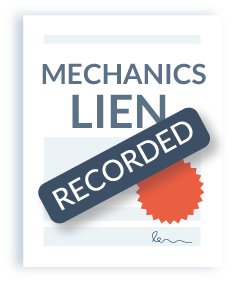
The coronavirus is affecting every facet of the US economy, especially the construction industry. With mandatory stay-at-home orders now in place across the country, construction in many places has literally come to a standstill. Many contractors may find that their huge backlog of work is suddenly shrinking due to projects being put on hold, or now being completely cancelled. As COVID-19 dries up cash, credit managers, accounting clerks, and others in the construction business will find it harder to collect on receivables. Filing a mechanics lien on every past due receivable is the most critical step you can take right now to get those accounts paid.
COVID-19 is creating an AR crisis for construction
If your crews aren’t working, you won’t be progress billing any projects, and you won’t be getting paid. An anticipated go-back-to-work set to occur at the end of April (fingers-crossed) means that your construction company will most likely experience a scenario similar to the below:
- Normal receivables for March, for worked performed in February (pre-shutdown)
- Limited receivables April, for work performed in March (shutdowns start)
- Virtually no receivables for May, for work performed in April (shutdown in full effect)
- A severe cash-flow problem in May and June
Even if construction workers are allowed back on the job site on May 1, contractors won’t be collecting payment for that work until the end of June. If the stay-at-home order has to be extended, then your cash-flow shortage will be extended as well.
Dig deeper: Accounts Receivable Management for Construction Companies
Post-COVID, receivables collection will get harder
Once we all have been given the all clear sign, and construction projects ramp back to normal, what’s going to happen?
Every one of your projects will start up simultaneously, and every one of them will be demanding that their project is your number one priority. In addition, every other subcontractor or supplier on the job will be jockeying to get their outstanding invoices to the top of the payment stack.
Every project manager will be struggling to make up for time lost, due to the shutdown. Lenders will want their projects finished quickly, as interest rates begin to increase. And material suppliers will be dealing with depleted inventories, and raising prices.
Many, many subcontractors will be working overtime, to try to get these projects back on schedule, or at least closer to completion. And, depending on your trade or craft, you can expect to see higher material costs almost immediately at the supply house.
This will leave many contractors trying to cover these higher than usual costs, at a time when their cash flow is barely trickling in, due to the work stoppages during March and April. Construction businesses will need as much cash on hand as possible to survive the post-COVID boom.
Speed up AR collection to protect your cash flow
Credit managers in construction need to act quickly to make sure they get paid for every invoice on every single project.
This is even more critical as we move into the post-pandemic recession, which is about to hit the global economy. Some of the effects that the industry is already seeing:
- Current building projects have been delayed 90-120 days
- Production stoppages have depleted inventories and stockpiles of materials
- New projects are being cancelled, due to projected higher costs
- Smaller workforce as some tradesmen change jobs/careers
- Money for project funding is already starting to dry up
The last point is especially troublesome for contractors, whose survival is reliant upon a healthy and sustainable cash flow.
As the money gets tight, the project owners and general contractors will have to determine who gets paid, and who has to wait for their payment. Typically, those who get paid first are the ones who have protected their lien rights correctly. If you haven’t sent the right notices – preliminary notices, NTOs, preliens, NOIs, etc – your GC or property owner won’t see your invoices as a priority. You will most certainly have to wait to get paid.

File A Mechanics Lien Now
Don't wait and hope that you'll get paid when this all blows over. Get to the front of the line.
FILE YOUR LIEN NOWMake your construction receivable a priority during COVID
Depending on your state requirements, there are specific timelines for filing the necessary forms and notices. If you don’t comply or miss a deadline, you may not be able to enforce any collection action (such as a mechanics lien) against the owner or contractor who hasn’t paid you.
If you cannot take any enforceable action towards the non-payer, you pose no legitimate threat to them, and you will likely have to wait for your money. If you are waiting to get paid, chances are your supplier is waiting for you to make a payment to them as well. Late payments to the supply house will mean problems when you need to get more materials to finish an existing project, or when you need to start a new one.
However, if the non-payer knows that you can file a lien on the project, you will be the first in line when they’re cutting checks. It’s essential that you closely adhere to the mechanics lien deadlines & requirements for your state. During COVID-19 – and in the months after – your mechanics lien process will likely determine whether or not you get paid – and how fast that check hits your bank account.
File a mechanics lien now on every past due receivable
With the uncertainty around when we can go back to work, the decline in project funding, and a recession looming on the horizon, contractors need to start filing mechanics liens on every project, right now. Some of the country’s top construction lawyers are urging construction businesses to file liens.
The reasoning is pretty simple behind this strategy.
It’s best to file those liens now, and then simply release the liens once the payment has cleared your bank account.
Yes, there are costs involved to file a mechanic’s lien, but the cost is very low compared to your risk for potential non-payment loss. You can look at these costs as a “cheap insurance” premium to make sure that your company gets paid, and that will keep your cash-flow moving. The costs of filing and then releasing these liens may also be a deductible business expense (check with your CPA or accountant for clarity), meaning the filing costs are actually a “free insurance.”
With cash-flow shortages on the horizon for almost every contractor, the absolute smartest move is to collect all of your receivables due and get them into your bank account as quickly as possible. The greater your cash-on-hand, the easier it will be for your company to survive the work stoppages and the back to work expenses that we are all about to face.